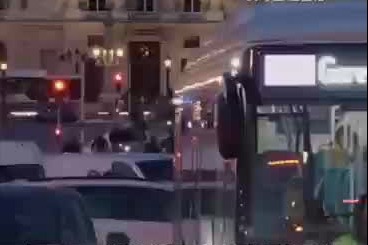Trump skeptical of mail ballots
By WILLIAM HENNELLY in New York | China Daily Global | Updated: 2020-08-25 10:50

US President Donald Trump, while making an unannounced appearance Monday as the Republican National Convention opened in Charlotte, North Carolina, raised doubts about the Nov 3 election.
Officially nominated Monday for a second term, Trump said "the only way they can take this election away from us is if this is a rigged election".
Trump repeated his claim that voting by mail, which will be much more common during the novel coronavirus pandemic, could lead to fraud in the handling of ballots.
"What they're doing is using COVID to steal an election," Trump said in Charlotte. "They're using COVID to defraud the American people — all of our people — of a fair and free election."
The Trump campaign has sued the state of New Jersey, which will send mail-in ballots to all registered voters.
Democrats, who have generally supported voting by mail, arguing that the pandemic has necessitated it, maintain that the US Postal Service is unprepared to handle a massive influx of ballots, which some estimates put at 50 percent of the 2020 electorate.
They contend that changes during Postmaster General Louis DeJoy's tenure are causing widespread delays, but Republicans dismiss the concerns as part of a "conspiracy" against Trump.
"Either through gross incompetence, you have ended the 240-year history of delivering the mail reliably on time," Representative Stephen Lynch, a Massachusetts Democrat, said at a contentious Capitol Hill hearing Monday. "Or ... you're doing this on purpose and deliberately dismantling this once-proud tradition."
"I am not engaged in sabotaging the election," DeJoy told lawmakers.
A major Republican donor, DeJoy said that like the president, he plans to vote by mail.
DeJoy, who has led the USPS since June, said that election mail is his "No. 1 priority" and that he will authorize expanded overtime, extra truck trips and other measures before the election to ensure timely delivery of ballots.
The Democratic-led House on Saturday voted to prevent DeJoy from taking action that would impede service until January, and to provide $25 billion in funding, although DeJoy said last week that no changes would happen until after the election. The legislation is not expected to advance in the Republican-controlled Senate, and Trump has threatened to veto it.
The convention kicked off with a day of "official business" in Charlotte before it moves to Washington DC for prime-time programming.
Trump, 74, plans to speak every day of the four-day convention, in contrast to his Democratic opponent, former vice-president Joe Biden, 77, who made brief taped appearances before his 20-minute acceptance speech last Thursday.
Partisan critics have said that Trump is making the show all about him.
At the Charlotte Convention Center on Monday, only 336 delegates sat at well-spaced tables, and masks were mandatory in response to the pandemic.
The Democrats held an all-virtual convention last week, but the Republicans persisted in having some sort of physical gathering. The contrast is emblematic of the differences in approach to pandemic-related lockdowns by "blue" (Democrat-led) and "red" (Republican-run) states.
Trump also criticized North Carolina's Democratic governor, Roy Cooper, for measures implemented to contain the virus, which has killed more than 175,000 people in the US and infected millions. The president accused Cooper of "being in a total shutdown mode" and claimed the restrictions were aimed at trying to hurt his campaign.
The 336 delegates — six from each of the 50 states, the District of Columbia and US territories — were invited to cast proxy votes on behalf of the more than 2,500 regular delegates.
Attendees also are being tested on-site and have been asked to maintain a 6-foot (1.8-meter) distance from other people and to use face coverings. The RNC said it would contact participants five, 14 and 21 days after the event to check on potential symptoms.
Republicans also approved a handful of resolutions, including one that backs Columbus Day as a federal holiday and another that labels the Southern Poverty Law Center, which monitors the country's hate groups, as a "radical organization".
Another resolution targets "cancel culture", warning that it "has grown into erasing of history, encouraging lawlessness, muting citizens and violating free exchange of ideas, thoughts, and speech".
Most of the GOP convention will take place in Washington at and around the White House, as well as by video.
"What they won't hear is what American families have urgently needed and been forced to go without for over seven consecutive months: any coherent strategy for defeating the pandemic," Biden campaign spokesman Andrew Bates said.
Among the Republicans scheduled to speak Monday were Tim Scott, an African American US senator who represents South Carolina, a state whose black vote helped reverse Biden's once-slumping fortunes in the Democratic primaries.
Trump is looking to increase his share of the black vote and has stressed the community's record low unemployment rate before the pandemic.
Kim Klacik, 38, a black woman from Baltimore who is running for Congress, also was scheduled to speak, as was Donald Trump Jr.
First lady Melania Trump will speak Tuesday from the Rose Garden;Vice-President Mike Pence will talk from Fort McHenry in Baltimore on Wednesday; and the president will deliver his acceptance speech on Thursday from the South Lawn of the White House.
Neither ex-president George W. Bush nor 2012 Republican presidential nominee Senator Mitt Romney of Utah, who voted to convict Trump at the president's impeachment trial in February, will be convention speakers.
The Associated Press and Reuters contributed to this story.
























